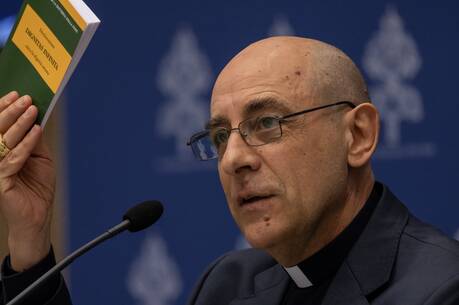The Readings for Sunday, August 28, the Twenty Second Sunday in Ordinary Time (Jeremiah 20:7-9; Psalm 63: 2-9 ; Romans 12: 1-2; Matthew 16: 21-27), raise two questions, one simple and one complex: How does it feel to suffer? What does it mean to suffer?
Suffering consumes the body, even when the anguish is psychological or spiritual, or troubles the mind and spirit, even when the pain is primarily physical. The whole person suffers. We feel this suffering to greater or lesser degrees when those near or far from us suffer. Suffering can be so traumatizing that it brings life to a virtual halt, as I saw so often when I worked at a crisis intervention and suicide prevention clinic. Meaning, purpose, desire and hope seem not only absent, but gone forever. These feelings are not exaggerated, not dramatized and not put on – they burrow into the person and hold on tight. For all of us who know suffering, as all of us will at some point in our lives, we do not desire it for ourselves, but also not for those we love or even those we do not know. It is this longing, I think, that lies behind Peter’s wish that his teacher, friend and Messiah not suffer and face the trauma he describes at the hands of his persecutors. For it is immediately after Jesus told “his disciples that he must go to Jerusalem and suffer greatly,” that Peter “took Jesus aside and began to rebuke him, ‘God forbid, Lord! No such thing shall ever happen to you.’” This is, indeed, the natural human response, to protect the ones we love and save them from suffering.
Yet, Jesus knows another way: “you are thinking not as God does, but as human beings do.” So, does God desire suffering, the pain of sorrow and loss? Is that the way of God which Jesus is teaching? How could anyone who has looked on the brokenness of human life see this as the way of God? Jesus says that, “Whoever wishes to come after me must deny himself, take up his cross, and follow me,” but this seems like cold comfort for those who have suffered or suffer now. It is not, however, the end of the story. The reality of suffering is that it must be overcome, cosmically by Jesus, but by each of us in the way we treat those in need, in the way our actions reject the words and deeds that create suffering for ourselves and others. We are not called to be accepting sufferers, but willing sufferers, who are called to bring an end to evil. The purpose of suffering in light of Christ’s salvific act is the transformation of that very suffering.
Jeremiah, it is true, speaks of the pain and derision that his faithfulness to God brings, but he acknowledges that God overwhelms him: “I say to myself, I will not mention him, I will speak in his name no more. But then it becomes like fire burning in my heart, imprisoned in my bones; I grow weary holding it in, I cannot endure it.” God overpowers even our suffering, for God is the true heart of our yearning, as the Psalmist cries, “My soul is thirsting for you, O Lord my God. Thus have I gazed toward you in the sanctuary to see your power and your glory, For your kindness is a greater good than life;
my lips shall glorify you” (Psalm 63). It is not that God in this world has brought suffering to an end, but that God has shown that the true end rests with him and that even in suffering we have in God’s love, incarnated fully in Christ himself, the end that transforms all life into its intended purpose: eternal life with God.
It is for this end, I believe, that the Apostle Paul urges the Romans in the 1st century, as he urges us today, not to “conform yourselves to this age but be transformed by the renewal of your mind, that you may discern what is the will of God, what is good and pleasing and perfect” (Romans 12:2). “This age,” whether in Paul’s Rome or 21st century Washington, values power, wealth, and fame, over the amelioration of suffering. Christ took no joy in suffering for its own sake, as we can take no joy in our suffering or that of others, but we can recognize that if we must suffer in this world we will do it in order to help others and ourselves see that “your kindness is a greater good than life.” God’s kindness and love is in fact life in all its fullness. In this recognition is embodied, too, the need not to glorify suffering nor to accept it with resignation, but to bring suffering wherever and whenever we can to an end and wait with hope to God’s final transformation of suffering into divine love.
John W. Martens
Follow me on Twitter @johnwmartens







